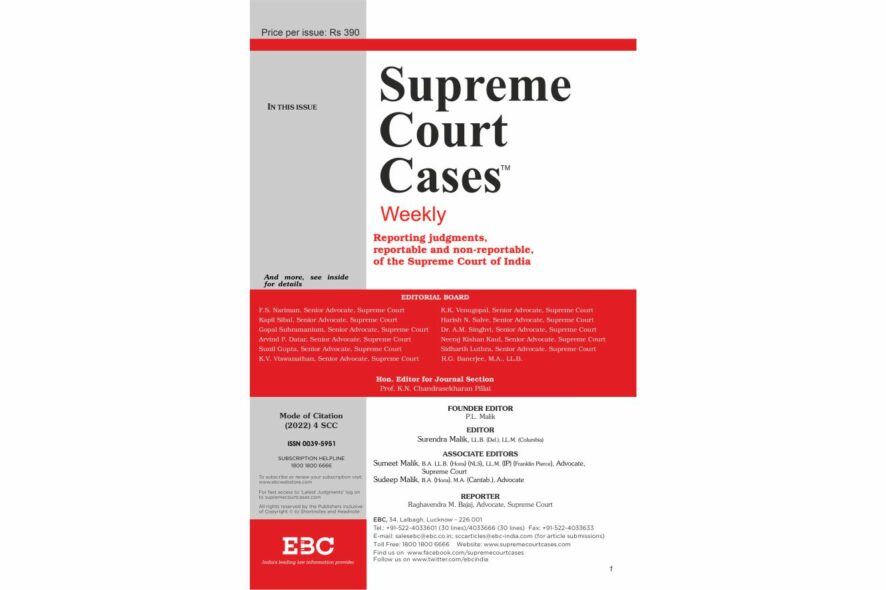Constitution of India — Art. 226 — Interference in service matters — Long-standing practice — Scope of interference — Limited: Long practice which was being followed, if not contrary to law, must be given its true importance and ordinarily is not to be interfered with in exercise of power of judicial review under Art. 226. [Jagathy Raj V.P. v. Rajitha Kumar S., (2022) 6 SCC 299]
Employees’ Compensation Act, 1923 — Ss. 30 and 3 — Appeal to High Court — Maintainability: When no substantial question of law arising within meaning of S. 30 nor were findings of Commissioner perverse or suffering from any such manifest illegality as to give rise to a “substantial question of law” for consideration of High Court, High Court, held, could not have interfered with order of the Commissioner. [C. Manjamma v. New India Assurance Co. Ltd., (2022) 6 SCC 206]
Energy, Power and Electricity — Electricity — Tariff — Determination or Fixation/ Review/ Concession/ Exemption/ Incentive/ Rebate/ Subsidy/ Surcharge/ Slabrates/ Entertainment, Amusement, Leisure and Sports — Liquor — Trade, Sale, Supply and Taxation of Liquor — Licence/ Levy/ Liquor vend — Excise Duty: Exigibility of Liquor produced but destroyed in fire incident, to excise duty under the Act and Rules concerned, when cause of incident attributable to negligence of the assessee, determined. [State of U.P. v. McDowell & Co. Ltd., (2022) 6 SCC 223]
Industrial Disputes Act, 1947 — S. 10 — Territorial jurisdiction — Whether Labour Court at Delhi or Labour Court at Ghaziabad had jurisdiction — Determination of — Matters to be considered: Issue of territorial jurisdiction to be decided as preliminary issue as far as possible. [V.G. Jagdishan v. Indofos Industries Ltd., (2022) 6 SCC 167]
Insolvency and Bankruptcy Code, 2016 — S. 61(3)(ii) — Grounds for appeal — Material irregularity in exercise of the powers by resolution professional (RP) during corporate insolvency resolution period — “Material irregularity” — What is: Words “illegally” and “material irregularity”, held, do not cover either errors of fact or law. They do not refer to the decision arrived at but to the manner in which it is reached. Errors contemplated relate to material defects of procedure and not to errors of either law or fact after the formalities which the law prescribes have been complied with. [Ngaitlang Dhar v. Panna Pragati Infrastructure (P) Ltd., (2022) 6 SCC 172]
Juvenile Justice (Care and Protection of Children) Act, 2000 — S. 7-A: Plea of juvenility is to be raised in a bona fide and truthful manner. Therefore, if the reliance is on a document to seek juvenility which is not reliable or dubious in nature, the appellant cannot be treated to be juvenile only on the ground that the Act is a beneficial legislation. [Manoj v. State of Haryana, (2022) 6 SCC 187]
Narcotic Drugs and Psychotropic Substances Act, 1985 — S. 20 — Reversal of acquittal by High Court — Whether proper: In this case, the High Court proceeded to consider evidence on record straightaway without considering reasons that had weighed with trial court in acquitting them. Considering totality of circumstances, assessment on facts made by trial court, held, was absolutely correct and did not call for any interference by High Court. Hence, acquittal was restored. [Sanjeev v. State of H.P., (2022) 6 SCC 294]
Security deposit — Regulation of tariff under scheme of the 2004 Regulations — Power of State Regulatory Commission — Scope of: In this case, Commission altered the standard format of agreement under the 2004 Regulations with retrospective effect which in turn affected tariff to the prejudice of respondent captive generating company. It was held that said modification of agreement which changed the tariff to the prejudice of the respondent, held, is a substantial modification and could not have been made effective with retrospective effect. [Ajmer Vidyut Vitran Nigam Ltd. v. Hindustan Zinc Ltd., (2022) 6 SCC 282]
Service Law — Age — Determination of — Date of birth: In this case, discrepancy in date of birth was recorded in service book and statutory Form B i.e. in service book date of birth recorded as 21-9-1949 while in Form B it was stated to be 21-9-1945. Correction in date of birth by employer in service book as per Form B unilaterally without hearing employee at fag end of his career, held not permissible. [Shankar Lal v. Hindustan Copper Ltd., (2022) 6 SCC 211]
Service Law — Pay — Parity in pay/Pay scale — Removal of anomaly by stepping up pay of seniors on promotion drawing less salary than their juniors who had availed benefit of ACP Scheme — Justifiability of: In this case, employees who were junior to respondents who were granted promotion were drawing higher pay on account of upgradation granted to them under ACP Scheme. The Supreme Court held held that the High Court was justified in relying on FR 22 and order issued by GoI for removing anomaly while directing stepping up of pay of respondents from date they started drawing lesser pay than their juniors. No interference with impugned judgment was called for. [Union of India v. C.R. Madhava Murthy, (2022) 6 SCC 183]






